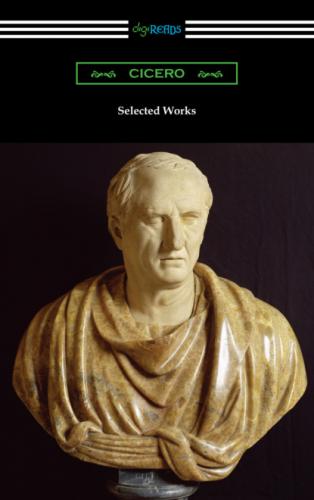SELECTED WORKS
By MARCUS TULLIUS CICERO
Selected Works
By Marcus Tullius Cicero
Translated by C. D. Yonge, Walter Miller, and E. S. Shuckburgh
Print ISBN 13: 978-1-4209-7142-2
eBook ISBN 13: 978-1-4209-7143-9
This edition copyright © 2020. Digireads.com Publishing.
All rights reserved. No part of this publication may be reproduced, distributed, or transmitted in any form or by any means, including photocopying, recording, or other electronic or mechanical methods, without the prior written permission of the publisher, except in the case of brief quotations embodied in critical reviews and certain other noncommercial uses permitted by copyright law.
Cover Image: a detail of a bust of Marcus Tullius Cicero, Roman, (1st century BC), (marble & stone) / Bridgeman Images.
Please visit www.digireads.com
CONTENTS
AGAINST VERRES: FIRST PLEADING
THE SECOND PHILIPPIC AGAINST MARCUS ANTONIUS
BOOK III. THE CONFLICT BETWEEN THE RIGHT AND THE EXPEDIENT
A DIALOGUE CONCERNING ORATORICAL PARTITIONS
THE TREATISE ON THE BEST STYLE OF ORATORS
THE TREATISE ON RHETORICAL INVENTION
BOOK I. ON THE CONTEMPT OF DEATH.
BOOK IV. ON OTHER PERTURBATIONS OF THE MIND.
BOOK V. WHETHER VIRTUE ALONE BE SUFFICIENT FOR A HAPPY LIFE.
Against Verres: First Pleading
After the last oration it was decided that Cicero was to conduct the prosecution against Verres; accordingly, a hundred and ten days were allowed to him to prepare the evidence, with which object he went himself to Sicily to examine witnesses, and to collect facts in support of his charges, taking with him his cousin Lucius Cicero as an assistant, and in this journey, contrary to all precedent, he bore his own expenses, resolving to put the island to no charge on his account. At Syracuse the praetor, Metellus, endeavoured to obstruct him in his inquiries, but the magistrates received him with great respect, and, declaring to him that all that they had previously done in favour of Verres (for they had erected a gilt statue of him, and had sent a testimonial of his good conduct and kind government of them to Rome) had been extorted from them by intrigue and terror, they delivered into his hands authentic accounts of many injuries their city had received from Verres, and they revoked by a formal decree the public praises which they had given him. Messana, however, continued firm in its engagements to Verres, and denied Cicero all the honours to which he was entitled. When he finished his investigations, apprehending that he might be waylaid by the contrivance of Verres, he returned by sea to Rome, where he found intrigues carrying on to protract the affair as much as possible, in order to delay the decision of it till the year following, when Hortensius and Metellus were to be the consuls, and the brother of Metellus was to be praetor, by whose united authority the prosecution might be stifled: and it was now so late in the year that there was not time to bring the trial to an end, if the ordinary course of proceeding was to be adhered to. But Cicero, determined to bring on the decision while Glabrio continued to be praetor, abandoned his idea of making a long speech, and of taking up time in dilating on and enforcing the different counts of the indictment, resolved to do nothing more than produce his witnesses and offer them to examination. This novel method of conducting the case together with the powerful evidence produced, which he could not invalidate, so confounded Hortensius that he could find nothing to say in his client’s defence, who in despair went of his own accord into banishment.
The object of Cicero in this oration is to show that it is out of sheer necessity that he does this, and that he is driven to such a proceeding by the intrigues of the opposite party. He therefore exhorts the judges not to be intimidated or cajoled into a dishonest decision, and threatens the opposite party with punishment for endeavouring to corrupt the judges.
I. That which was above all things to be desired, O judges, and which above all things was calculated to have the greatest influence towards allaying the unpopularity of your order, and putting an end to the discredit
